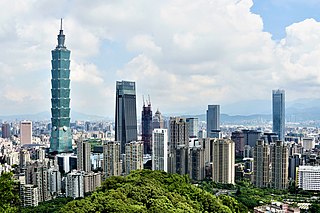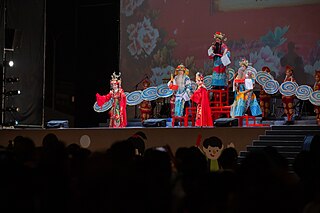Lists of Taiwanese dramas are grouped by date and include the following:
Lists of Taiwanese dramas are grouped by date and include the following:
This is a list of television shows and articles.

Taipei, officially Taipei City, is the capital and a special municipality of Taiwan. Located in Northern Taiwan, Taipei City is an enclave of the municipality of New Taipei City that sits about 25 km (16 mi) southwest of the northern port city of Keelung. Most of the city rests on the Taipei Basin, an ancient lakebed. The basin is bounded by the relatively narrow valleys of the Keelung and Xindian rivers, which join to form the Tamsui River along the city's western border.
F4 or JVKV was a Taiwanese boy band consisting of Jerry Yan, Vanness Wu, Ken Chu, and Vic Chou. The group F4 was formed in 2001 after the Taiwanese drama Meteor Garden that they starred in was widely successful. Together they have starred in several Taiwanese drama series and released three albums, Meteor Rain (2001), Fantasy 4ever (2002), and Waiting for You (2007).

Taiwanese opera commonly known as Ke-Tse opera or Hokkien opera, is a form of traditional drama originating in Taiwan. Taiwanese opera uses a stylised combination of both the literary and colloquial registers of Taiwanese Hokkien. Its earliest form adopted elements of folk songs from Zhangzhou, Fujian, China. The plots are traditionally drawn from folk tales of the southern Fujian region, though in recent years stories are increasingly set in Taiwan itself. Taiwanese opera was later exported to other Hokkien-speaking areas, such as Singapore, Malaysia, the Philippines, and Fujian, China.

Harlem Yu is a Taiwanese singer-songwriter, television host and businessman. He is particularly well-known for singing the theme song, Qing Fei De Yi, for the 2001 television drama, Meteor Garden. He made a cameo in both that version and the 2018 remake, Meteor Garden performing Qing Fei De Yi (情非得已). He has been hosting television shows in Taiwan since 1994 and in China since 2011, and served as a coach for three seasons of The Voice of China and three seasons of Sing! China.
Taiwanese drama refer to dramatic programming of television programming extended stories usually dramatizing relationships through the general range of ten to forty one-hour episodes. They are produced in Taiwan and have gained increasing popularity in the Mandarin-speaking community internationally. The term "Taiwanese drama" is applied to Taiwanese miniseries in general, even including those with greater elements of comedy than of drama.

Formosa Television is a television station based in New Taipei, Taiwan. Established on March 27, 1996, FTV began broadcasting on June 11, 1997.

Taiwan Television Enterprise, Ltd., commonly known as TTV and formerly known as Central Television and Voice of Taiwan, is the first terrestrial television station in Taiwan. It was established on April 28, 1962, and started formally broadcasting later that year on October 10, 1962, as free-to-air. It is the first television company in Taiwan.

Sanlih Entertainment Television or Sanlih E-Television is a nationwide cable TV network operated in Taiwan which was founded in May 1993. It also produces Taiwanese drama that are broadcast on free-to-air channels e.g. Taiwan Television (TTV).
Television in Taiwan is primarily in Chinese and English. It is delivered through analog and digital, cable, IPTV, and the Internet.
The Asia–Pacific and Middle East Region is a region that competes in the Little League World Series. Asian teams first competed in the LLWS in 1961, when Japanese teams competed in the original Pacific Region. In 1962, Japanese teams began competing in the newly created Far East Region.

Taiwanese wave is a neologism originally coined in Japan to refer to the increase in the popularity of Taiwanese popular culture in the country, and to distinguish it from the Korean wave co-existing in Japan. Many Taiwanese dramas, songs as well as idol actors, singers, bands or groups have become popular throughout East Asia and Southeast Asia.
The Columbia Anthology of Modern Chinese Literature is a 1995 anthology of Chinese literature edited by Joseph S. M. Lau and Howard Goldblatt and published by Columbia University. Its intended use is to be a textbook.

This page contains the lists of airports in Asia by country, grouped by region and activity. The lists include both military air bases and civilian airports. There are lists for countries with limited international recognition and for dependencies of other countries.